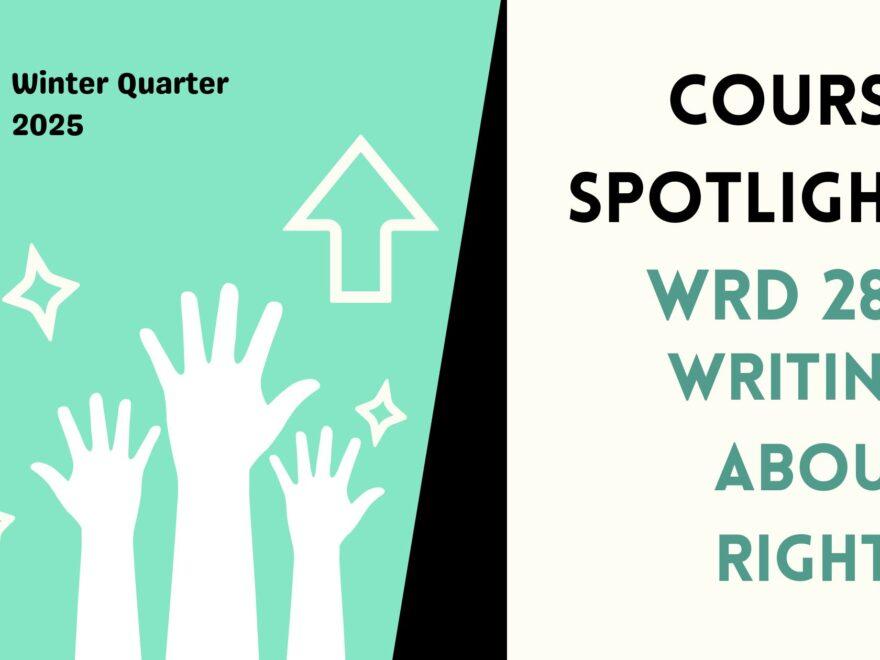In a social context where people must consistently navigate their rights, or lack thereof, it is important to understand how rights claims function as a specific rhetorical tool. This Winter Quarter 2025, Dr. Jason Schneider will be exploring rights rhetoric by teaching WRD 289: Writing about Rights so students can gain a deeper understanding of the role language plays in shaping social and political movements. Read on to hear from Dr. Schneider as to what students should expect from the course and learn why you should enroll!
What are your goals for the course and what can students hope to learn?
I want to help students discover new ways of thinking about people’s claims for rights, which are ubiquitous today. More specifically, I want to help students learn how to look beyond the what of rights claims—the content of what individuals or groups are demanding—and even the why of rights claims—the social and material conditions that give rise to those claims. Instead, this course will focus on the how of rights discourses—that is, how rights claims function as a specific way of using language to achieve social and political goals. Once we learn to engage with that side of it, the how, we can connect back to the what and why.
What sparked your interest in teaching this subject?
We see rights claims everywhere today, and from all over the political spectrum. It’s almost banal for someone to say, “I have a right to…” But this kind of claim represents complex assumptions and goals, so I think it’s valuable to understand this mode of discourse, which some call “rights talk.”
For example: What does it mean that diverse social actors who believe they are being denied equal access to resources use the language of “rights” to effect social change? What does it mean that others call on that same language to resist those calls for social change? There are, of course, legal dimensions of these questions—as we all learn when important cases move up through the courts. But this class isn’t about legal or political theories of rights—not directly, anyway. It’s about writing, rhetoric, and language, and the ways that those lenses can help us understand “rights talk” as a powerful form of activist discourse.
How is the course structured?
It will be an asynchronous course, so everything will be set up on D2L as weekly modules, including readings, homework assignments, and other activities to be submitted on specific dates.
What major projects will be assigned to students?
In the first half of the course, we’ll focus mainly on analysis—trying to understand rights discourse as a genre. This will include writing a paper for which students find an example of rights discourse and break it down with the help of frameworks we’ll learn. The second half of the course will turn more towards producing rights discourse, and before the end of the quarter students will write an argument in support of some kinds of rights of special importance to them.
Who should take this course and why?
It should definitely be interesting for WRD majors and minors, and it will include elements of the R and D, through the analysis work, and the W, in the case of the projects, especially later in the quarter. It should also be interesting for students from other majors who have studied rights more from the content side—what do groups say they want and deserve, and what are the social conditions motivating those arguments—but who have not considered the rhetorical and linguistic sides of it—again, what I would call the how of rights.
What final thoughts would you like to leave students with?
We’re all inside the discourse of rights—it’s fundamental to our social and political culture. This course is a chance both to study that in a new way and to gain rhetorical skills that could help you engage in your own forms of rights activism.
Conclusion
As we engage with the pervasive discourse of rights, WRD 289: Writing about Rights provides a unique opportunity to reflect on the rhetorical power behind these claims. By focusing on how rights talk operates as a tool for activism and social change, students will not only sharpen their analytical skills but also acquire the ability to craft their own compelling arguments in support of causes that matter to them. Enroll in WRD 289 this Winter Quarter to engage in more than just an academic exploration—but a chance to gain the knowledge and tools necessary to navigate, critique, and participate in the rights conversations that shape our world.
